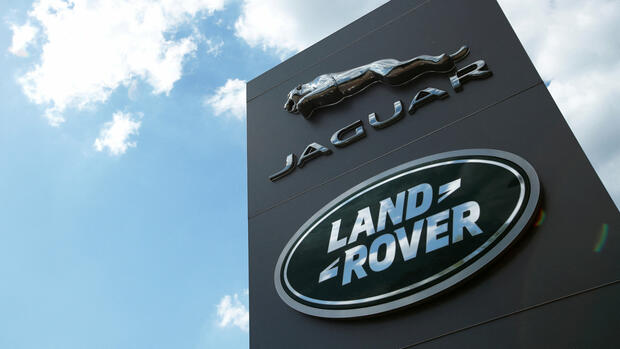The British carmaker announces an investment offensive.
(Photo: Reuters)
Gaydon The traditional British brands Jaguar and Land Rover are about to make a radical new start. The parent company JLR Ltd plans to spend around 15 billion pounds (around 17 billion euros) over the next five years. The British car manufacturer, which belongs to the Indian Tata Group, wants to achieve the transition to climate-neutral production of a fully electric model range by 2039 and reinvent the cult brand Jaguar.
“Two years ago we embarked on the Reimagine strategy journey and have made great strides since then. This enabled us to make a profit in the third quarter,” interim chief executive Adrian Mardell said Thursday at JLR’s Gaydon headquarters.
The 61-year-old CEO took over in November 2022 from former Renault manager Thierry Bolloré, who initiated the British carmaker’s restart under the name “Reimagine”, but then gave up after two years.
The strategy will focus on the four brands Range Rover, Defender, Discovery and Jaguar. The 75-year-old traditional name “Land Rover” should only serve as an umbrella brand. Mardell did not want to reveal much about the course of Jaguar. In the future, there will be a family of three all-electric models, the first of which, a four-door sedan with a range of 700 kilometers, will be launched in 2025.
The British still keep a secret about the design. “The key to Jaguar’s transformation lies in a unique design that copies absolutely nothing,” Chief Creative Officer Gerry McGovern said on Thursday.
With a cost price of around 100,000 pounds (around 114,000 euros), JLR aims at the “modern luxury segment”, in which far larger competitors such as Audi, BMW and Mercedes cavort. With its “I-Pace” model, Jaguar was one of the first luxury manufacturers to come onto the market with a fully electric vehicle back in 2018. Since then, however, the British have lagged behind the offensive of the competition in electromobility.
Unsolved question of battery production
They now want to make up for this deficit: “JLR is entering a new electric era as a modern luxury company,” says Mardell and announces that it will be launching a purely electric luxury SUV on the market from 2024 under the “Range Rover” brand. The vehicle is to be built at the Solihull plant.
The Achilles’ heel of what Mardell calls JLR’s “rebirth” could be the still unresolved issue of battery production. The company boss confirmed that the parent company Tata wanted to build a gigafactory in Europe. Where that will be, however, still seems unclear.
According to reports, Great Britain and Spain in particular are struggling to win the Indian contract with promises of high subsidies. Tata is said to have requested government aid of more than £500m from the British government, according to reports in the Financial Times. The Indians took over JLR in 2008.
By 2039, there will be only fully electric luxury cars from Jaguar.
(Photo: AFP)
It would still be four years before the battery could be produced anyway, which is why JLR will largely be dependent on supplies from foreign suppliers until then. Mardell assured that his company could live with a decision by Tata for a foreign location.
For the British automotive industry, however, that would be another vote of no confidence after the plans of the battery start-up British Volt recently ended in bankruptcy.
The company has recovered economically after years of heavy losses. “We’re profitable and we’re reducing our debt at a fast pace,” says Mardell. The breakeven point was halved compared to 2019 from 660,000 vehicles to 300,000 vehicles per year.
The order book is well filled with 200,000 orders – which, however, also has to do with delivery problems during the pandemic.
Net cash will turn positive by 2025, Mardell said, promising a double-digit EBIT margin by 2026. That is quite ambitious, as the EBIT margin in the third quarter of last year was still 3.7 percent.
Losing past
A few years ago the situation was even worse: The British carmaker, whose former boss Ralf Speth once wanted to compete with Mercedes and BMW with a production of one million vehicles, was pinched by the German luxury manufacturers, Tesla and the Chinese electric vehicle manufacturers taken.
The last annual profit dates back to 2018. Now JLR wants to be resurrected as a “modern luxury provider”.
More: Rising sales at Land Rover – supply chains are stabilizing
